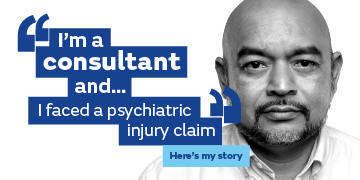Drugs and seizure lead to GMC hearing
Post date: 20/06/2022 | Time to read article: 4 minsThe information within this article was correct at the time of publishing. Last updated 23/06/2022
Dr A, a specialty trainee, attended a music festival where he bought and took cocaine.
Shortly afterwards Dr A suffered a seizure and was taken to the emergency department of the local hospital. He was admitted overnight for observations. Dr A informed his clinical supervisor who asked him to come to see her before he returned to work and explained she would discuss the matter with the medical director.
Two days later, Dr A and his clinical supervisor attended a meeting with the medical director. At the meeting Dr A was informed that the hospital was immediately excluding him and requesting an urgent occupational health review. Dr A expressed deep regret for his actions and apologised for the disruption to the service that his actions had caused.
The medical director requested that he self-refer to the General Medical Council (GMC) and asked for confirmation he had done so within the next 48 hours.
Extremely upset, Dr A contacted Medical Protection for advice. The Medical Protection advisory team advised him that there was no absolute obligation to self-refer to the GMC, but in light of the medical director’s direction it was advisable to do so promptly.
Medical Protection also advised Dr A to engage fully and openly with occupational health and suggested he consider seeing his own GP.
As the matter arose from Dr A’s personal conduct, he was advised that assistance with the Trust investigation was not within the scope of the benefits of Medical Protection membership. He was advised it was likely he would receive correspondence from the Medical Council, however, and if so, to contact Medical Protection immediately so the issue of assistance could be considered.
Three days later Dr A called as he had received a letter from the GMC inviting him to attend a hearing five days later.
Medical Protection assisted Dr A with the GMC investigation and a Medical Protection solicitor was instructed.
At the hearing, the GMC solicitor recommended to the panel that conditions should be placed on Dr A’s registration.
On Dr A’s behalf, the Medical Protection solicitor submitted that imposing conditions on Dr A’s registration would be premature and unnecessary. She highlighted that Dr A had shown insight in to his wrongdoing, been open and candid from the outset and complied fully and promptly with occupational health. She further submitted that Dr A was currently not practising clinically and that arrangements were in place for hair testing by occupational health. If the results of those tests were positive, the GMC could invite Dr A to a further hearing; imposing conditions while those tests were pending would be disproportionate.
The panel determined no order was necessary and the matter could be reconsidered when further information was available.
Shortly afterwards the results of Dr A’s hair testing became available, which showed recent use of cocaine but no evidence of prior usage.
The hospital convened a meeting with Dr A and they agreed he could resume clinical duties and would have regular meetings with his clinical supervisor to support his return to practise. Further unannounced hair testing was arranged by occupational health.
The GMC investigation of the case continued and Dr A attended two health assessments arranged with two GMC-appointed health assessors, who liaised with his GP and occupational health. They concluded he had no underlying addiction and that this was likely to be a one-off event.
Over the next eight months Dr A had two more negative hair tests. He reflected at length on what happened, discussed it in his appraisal and devoted time to teaching medical students and junior colleagues about the importance of ensuring their behaviour at all times reflects the standards of the profession.
At the conclusion of the GMC investigation, the GMC wrote to Dr A with a letter setting out the allegations in relation to his misconduct, and explained they were minded to conclude the case with a warning.
Dr A had a further meeting with Medical Protection to prepare a response. He was advised that a warning was potentially a proportionate outcome; however, given the extent of Dr A’s remediation, it was decided that the response would propose the case could be concluded with a letter of advice. A detailed response was drafted, supported by Dr A’s reflections, feedback from his clinical supervisor, the teaching sessions he had undertaken and positive testimonials from medical students and colleagues.
Outcome
After an anxious wait, Dr A received a letter from the GMC advising him that the matter was concluded with a letter of advice. Two years on from this event, Dr A secured a consultant post in another hospital.
Learning points
- It is important doctors are aware that their conduct outside their clinical work can have consequences for their professional life and their registration.
- Dr A’s early contact with Medical Protection ensured that the team were able to advise him on the important step of a self-referral to the GMC. In this case it was inevitable the hospital would inform the GMC and it was preferable Dr A did so first.
- Being excluded from all duties can be a deeply isolating and difficult experience for any healthcare professional.
- Expert advice is essential when navigating GMC procedures. The suggestion that the case could be concluded with a letter of advice was a finely balanced and carefully considered decision, which was only possible with an in-depth knowledge of all aspects of the case.
- The preparation of a detailed response to the GMC was a pivotal point in the case as it was Dr A’s opportunity to respond to the allegations, demonstrate insight into his actions and explain the steps he had taken to remediate.
- Demonstrating insight takes time and effort; it is a process that should be started as soon as possible.

